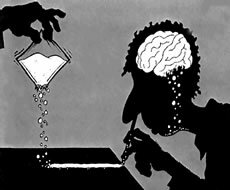Guarana powder, derived from the same fruit that gives the soda its name, is rich in caffeine and theobromine - substances found in coffee and chocolate, respectively, being the second with milder effects than first. The concentration of caffeine present in powdered guarana can be up to four times greater than that found in coffee; providing effects lasting an average of six hours.
Acting on the same central nervous system receptors as cocaine and amphetamines, but in a much lighter way, such substances increase the individual's alertness and give him a feeling of well-being, as they release adrenaline and dopamine in the blood. For this reason, guarana is widely used by students, especially in pre-university entrance exams.
The problem is that, depending on the individual's body and the time when the guarana was ingested, deep sleep, or even light sleep, can be compromised (read the text about the importance of sleep). Due to this factor, the subject tends to wake up feeling unwell, requiring the use of larger amounts of it, in order to feel very excited. Thus, it can start a vicious circle that, when broken, often gives the person symptoms such as headaches and depressed mood.
Do not stop now... There's more after the advertising ;)
Conclusion: if we consider as a drug any substance that alters the functioning of the central nervous system and that has potential in cause dependence, even if it is low, guarana powder can be considered a drug and, therefore, should be used rational.
By Mariana Araguaia
Graduated in Biology
See more:
the importance of sleep
Would you like to reference this text in a school or academic work? Look:
ARAGUAIA, Mariana. "Is Guarana Powder a Drug?"; Brazil School. Available in: https://brasilescola.uol.com.br/drogas/guarana-em-po-e-droga.htm. Accessed on June 28, 2021.

